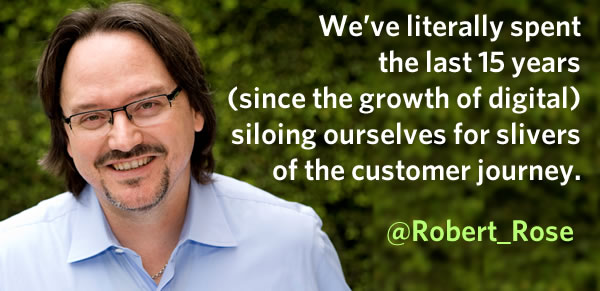
Robert Rose is the Chief Strategist at the Content Marketing Institute. In this interview with Robert we take a look the evolutions in content marketing and in related areas such as content management, customer experience management and storytelling.
Robert is known as one of the key driving forces of the Content Marketing Institute, with Joe Pulizzi. He is also the co-author of “Managing Content Marketing: The Real-World Guide for Creating Passionate Subscribers to Your Brand”.
When we first started talking about content marketing in 2009, Robert and Joe already had joined forces. And, while we interviewed Joe several times and organized a round table with him, prior to helping launch the European version of the Chief Content Officer magazine, we never interviewed Robert. If you’re familiar with Robert’s work, you’ll know it’s more than time to make that up! So, here goes.
You’re the Chief Strategist at the Content Marketing Institute. When did you meet Joe Pulizzi and started working with him?
Robert Rose: I met Joe way back in 2008, and he and I hit it off immediately. We were both talking about content marketing – and specifically the approach of it – but from two different lenses. He was talking from the publisher’s point of view – and I from the brand marketer’s point of view.

We decided that there was no “owner’s manual” for the content marketing process, and that’s when we decided to write a book together. During the writing of that book, CMI (Content Marketing Institute) was really expanding quickly and Joe asked me if I’d like to help him work with companies to deliver content marketing planning services. As I got more involved with CMI, I was then blessed to meet all the amazing people that make up this team – and I’m so glad to be on this path with all of them.
Did you expect, when you started at the CMI, that content marketing would become so “big” and are there areas where you believe the term might better not be used but is anyway?
Robert Rose: I did expect it; though perhaps not this quickly. After I had initial success with the approach, I knew that this would change marketing fundamentally – but I had no idea how quickly it would become such an important piece of marketing strategy. It’s because of this growth that, quite frankly, there is still a lot of confusion about the term more broadly.
Of course that’s our mission at CMI – to help advance the practice and assist marketers with getting their arms around it. There are definitely A LOT of different types of companies that are adopting the term just to ride the “buzz”. But this is the case with any popular new idea. In the end, it’s really the work that matters.
Talking about terms: in virtually every “content marketing predictions” list you read nowadays, I notice content marketers are saying it’s going to be just marketing. Same question as I asked one of the keynote speakers at our Content Marketing Conference Europe speakers, Doug Kessler in an interview: of course it is marketing and content is essential everywhere but how do you see the evolutions of content marketing yourself?
Robert Rose: I don’t actually agree that it will be “just marketing”. I believe that marketing and advertising that persuades and sells will always have a place in the business strategy. When content marketing is leveraged well – it is a differentiated approach that is infused and well integrated into the broader practice of marketing and communications.
So, I actually think that the evolution of content marketing becomes a practice within the business to handle this approach as a separate (but integrated) function. Businesses will become skilled at the creation, management and general use of content in the same way that they are becoming skilled at technology. Content is an integrated practice within the business – not a replacement for the practice of marketing.
On silos and the customer experience
Enough about terminology and predictions. We have something in common: we both have – among others – a content management and marketing technology background. You work at Digital Clarity Group, a research-based advisory firm focused on content technologies, marketing automation, etc. In content management, which is traditionally still more IT-related, and in marketing automation (and many other technologies and areas) the core message is “it’s about providing the right information/content at the right time to the right people across the right channels” and so on”. This is also a message in content marketing. Yet, each time I’m at an IT conference where this message is loud and clear, I never see marketers. And, each time, I’m at a marketing conference, hearing that same message, I see no IT people. While CIOs and CMOs are quick to say they work well together, there is clearly an issue. I wonder what your take on that is and how do you see all those technologies, platforms and processes integrating and connecting?
Robert Rose: Indeed, it’s a real challenge. I actually just wrote a blog post on this topic where I like to bust some of the myths around CMO and CIO “alignment”. Right now, for most businesses, they look at CMO/CIO alignment as making sure that the CMO understands the IT strategy and that the CIO understands the marketing strategy. This is a fool’s errand.
It’s like that classic Homer Simpson quote “just because I understand doesn’t mean I care.” Marketing and IT have to move beyond just understanding each other’s acronyms and actually develop a cohesive strategy that actually DOES facilitate the buyer’s journey with great content-driven experiences. Sadly, this is mostly still done in silos.
To be fair though – at least here in the states I am actually seeing a lot more marketers at traditionally content technology events and vice versa. I think we’re getting there – but it’s still early.

The narrative in the content management industry is shifting from a more technical and ‘systems of records’ narrative towards a focus on customer experiences and so-called ‘systems of engagement’. At Digital Clarity Group, customer experience management is a core topic too. And, again, I see IT execs, marketers and managers increasingly – and finally – putting customer experiences first. At the same time, different vendors of different solutions claim the market for customer experience management and optimization: some CMS vendors, some marketing automation vendors, some CRM vendors, some content marketing software vendors, you name it. In which of all these markets do you see a true focus on customer experience management? Are there any vendors that do better and how do you see this evolving?
Robert Rose: You’re so right. Every CMS vendor has latched on to some form of the Customer Experience buzz. And, the answer is “not really”. But, interestingly I don’t think this is (necessarily) all the software provider’s fault. The challenge is that organizations have spent the last 10 years siloing themselves across the buyer’s journey.
We’ve literally spent the last 15 years (since the growth of digital) siloing ourselves for slivers of the customer journey. We have a brand team, and a lead gen team, and a sales team, and a customer loyalty team, and a social crm team, and a measurement and data team. Is it any wonder that vendors have sliced themselves into optimizing for one of those waypoints on the customer journey? They had to do it.
Now, of course, we’re starting to see the pendulum swing back here – with the large companies offering up customer experience stacks (e.g Salesforce, Adobe, Oracle et. al). They are now recognizing that it’s actually a holistic process that needs to be addressed. But, the question remains – is it better to have one solution for the entire stack – or integrated best-of-breed solutions that hand off seamlessly between waypoints of the customer journey? I, honestly, think the answer could be either depending on the situation.
I asked quite some question on technology and systems. But they are important, even if they depend on the context of the business and customer goals. Another thing we have in common is the love of testing content marketing software. You tested a whole bunch of players and wrote reports about them. How do you see the content marketing software landscape and what have you learned from all those tests?
Robert Rose: Yeah, I’m not sure I LOVE it as much as I see it as necessary for me to stay current. Ha! Anyway, indeed, I have seen some very interesting technology. I’ve also seen some very boring un-inventive technology.
Mostly what I see is that content marketing software vendors are emerging in the gaps that the “traditional” companies in all those spaces you mentioned before (CMS, CRM, Marketing Automation) not covering. So, why CMS systems aren’t yet offering editorial calendaring in a meaningful way baffles me. Why marketing automation vendors haven’t moved into content scoring instead of (or in addition to) lead scoring is a mystery. Why measurement companies haven’t developed analytics on teams, and freelancers and helped to monetize the content creation process is just odd.
Anyway – there are some very interesting technologies being developed (especially on the search and normalization technologies inherent to great curation software).
I looked at some of your blog posts before this interview and seem to discover a passion that is far away from the whole technology and strategy dimension you know so well: storytelling. What makes it so appealing to you and can you share some lessons?
Robert Rose: Well it’s in my DNA for sure. I came out to Hollywood to be a songwriter and screenwriter – and in my fantasy I still have some of that in me. But truly – and this goes back to the question earlier – I believe that storytellers will be an inherent skill position in businesses moving forward.
This is a new era for marketing communications – and I think storytelling (and the skills that are needed for that) will become an increasingly important skill for businesses. If I can help advance that – it feeds my passion and helps me realize my boyhood dreams of being a storyteller for a living.
To conclude, some fun (I hope, at least). Please complete following sentences:
- Content marketing is…. a practice that not every business will be good at – but every successful business will.
- Robert Rose’s favorite hobby is… playing and composing music.
- If I would ask your friends they would tell you are…hopefully they would say a nice guy.
- The largest misconceptions about content marketing are… that it’s only for the top of the funnel.
- Joe Pulizzi is obsessed with orange and Robert Rose’s favorite color is… bluish-gray like the color of rainy skies.
- In five years from now, I see myself… helping businesses build content storytelling as a structured part of their business.
- The buzzword in content marketing or marketing as a whole Robert Rose absolutely despises is…. Native Advertising. Native advertising is… neither.
- Your biggest sources of inspiration in work and life are… Joseph Campbell, Theodore Levitt, My Wife Elizabeth.
- If there’s one thing Robert Rose would like his partner Joe Pulizzi to change it is… his disdain for the Dallas Cowboys.
That’s it folks. You can follow Robert on Twitter, LinkedIn and of course the blog of the CMI.

